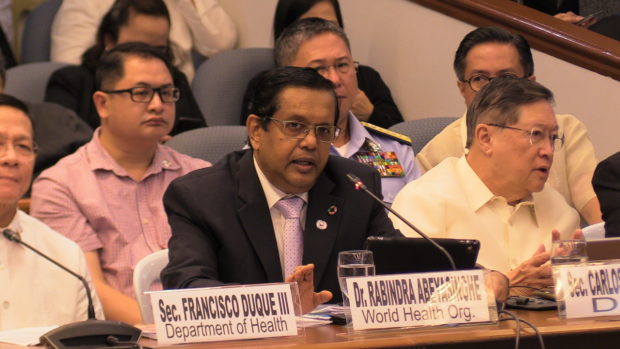
World Health Organization’s Dr. Rabindra Abeyasinghe attends Senate hearing on the outbreak of the 2019 Novel Coronavirus on Feb 4, 2020. INQUIRER.net file photo / CATHY MIRANDA
MANILA, Philippines — Relaxing requirements for COVID-19 testing only in travel between two areas that both have a very low transmission of coronavirus may be possible, the World Health Organization (WHO) said Tuesday.
WHO country representative Dr. Rabindra Abeyasinghe said this in an online media forum following an earlier pronouncement from DILG Undersecretary Epimaco Densing III that the department is mulling to no longer require travelers to get tested for coronavirus before going to their travel destination.
Densing said that instead of testing, the DILG plans to require clinical assessment for travelers at the terminals of origin and destination.
But for Abeyasinghe, this plan on relaxing requirements for COVID-19 testing needs a careful assessment.
“I think it needs to be carefully calibrated on where there is value for removing the requirement for testing. If you are traveling in an area with very low COVID [cases] to another area with very low COVID [cases], maybe there is an opportunity to relax the need for testing but that has to be very carefully assessed,” he said.
Abeyasinghe also pointed out that there is still the threat of new coronavirus variants and mutations.
“From this scenario, a very careful decision needs to be made whether you are allowing people to travel without testing from places where we already know that there is a new variant circulating,” he added.
He also noted that some areas still have a heavy transmission of the SARS-CoV-2 virus that causes Covid-19 while other areas have low levels of infections.
He said there should be a minimum transfer of the virus from places with high transmission to places with low transmission.
“For that purpose either testing people and making sure that they are not carrying the virus or ensuring that everybody who travels spends time in quarantine so they don’t potentially take virus into areas with low transmission and create new hotspots is important,” Abeyasinghe said.